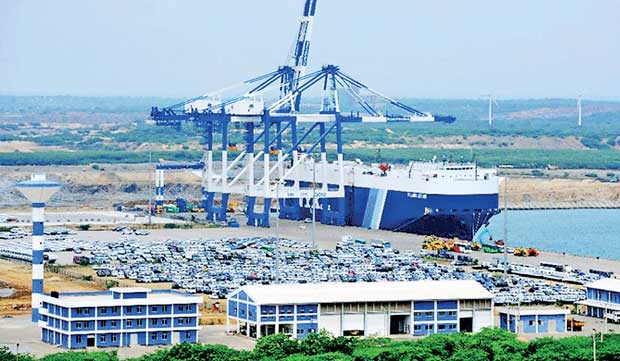22 Aug 2017 - {{hitsCtrl.values.hits}}

BY Amila Muthukutti
When developing a country, political matters have to be clearly differentiated from economic matters, because politics leads to elections, conquering the power, establishing groups to influence public opinions and so forth, while economic matters lead to an economic development or a recession, creating employments, increasing production and exports, attracting foreign direct investments (FDIs), etc. internecine politics will take the nation nowhere except for making it stagnant.
Unfortunately, the opportunistic politicians, whose sole objective is to come to power, have mistaken economic matters for political matters, making patriotism a best-selling commodity in the political arena.
The Hambantota port, a possible economic nerve-centre with enormous potential to contribute to the national economy, has now created a very emotional and patriotic debate among the public, especially in political perspective. Consequently, people are less informed of relevant economic advantages, when political disadvantages are repeatedly highlighted in the sake of patriotism.
Sri Lanka signed a US $ 1.1 billion deal to lease the Hambantota port to China, as a last resort in its struggle to settle debt. The port started its operations in November 2010, giving fresh expectations to the nation. However, the port could not perform as expected. Only 44 ships have been handled by the Hambantota port since 2015, despite the operational cost and debt repayment on the rise, which had to be made by the Sri Lanka Ports Authority (SLPA), amounting to about US $ 73 million in 2016.
Necessity
It is needless to say that the sale of revenue-generating assets is a sin and should be stopped at any cost. However, the logic behind the fact that the sale of loss-making public enterprises has to be questioned, regardless of political ideologies. Public enterprises need to contribute to the economy rather than being financed by tax revenue.
On the other hand, the deal was to lease out the port, but not to sell. The Chinese firm will run the operations of the port over a 99-year lease. Here, a 70 percent stake of the port was given to the Chinese firm, China Merchant Port Holdings, while Sri Lanka holds the rest.
The question as to why the port had to be leased out is directly connected with the necessity of debt repayment, as the country can no longer continue to finance for a loss-making enterprise. Now, it has been proved that Sri Lanka is no longer capable of operating the port in a profitable manner. Hence, linking it with an industry leader like China Merchant Port Holdings can be appreciated, as it has an enormous capacity to make it profitable. Accordingly, it can be stated that the necessity to lease it out is timely.
Potential
Just because the port was leased to a Chinese firm does not mean it has lost its strategic location, emphasizing its potential to blossom as a marine hub. The Hambantota port is strategically located within 10 nautical miles from the world’s busiest maritime lanes by which approximately 200 to 300 ships sail daily. It can be expected that the new investor will be able to attract a majority of these ships.
Not only international advantages but also domestic advantages can be easily reaped through this strategic location. The entire southern part is connected with this port. Furthermore, when the proposed factories and industrial zones are developed to the expected level, productions can directly be shipped via this port. Specially, it was planned to develop the Hambantota port as an industrial port, having considered the land availability in the area. This immense potential can be used economically under the leadership and management of the new investor, China Merchant Port Holdings.
Way forward
People are required to pay their attention towards the economic benefits of the project without being misled by opportunistic politicians that try to come to power by hook or crook. The Hambantota port is an economic factor rather than a political factor, as it has nothing political but economical.
What holds this country back is nothing other than the power struggle, present government criticizing previous governments and the opposition criticizing the present government, etc. No matter whatever political party rules the country, the economic projects must continue. Politics will be politics, but the economy has to be managed independently, if the rulers have a genuine idea to develop the country.
(Amila Muthukutti is an economist)
25 Nov 2024 11 minute ago
25 Nov 2024 29 minute ago
25 Nov 2024 54 minute ago
25 Nov 2024 1 hours ago
25 Nov 2024 2 hours ago